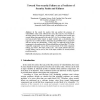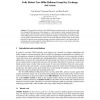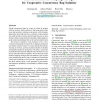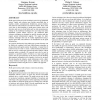5 search results - page 1 / 1 » Toward Non-security Failures as a Predictor of Security Faul... |
ESSOS
2009
Springer
13 years 11 months ago
2009
Springer
In the search for metrics that can predict the presence of vulnerabilities early in the software life cycle, there may be some benefit to choosing metrics from the non-security rea...
HICSS
2003
IEEE
13 years 9 months ago
2003
IEEE
It is now apparent that our nation’s infrastructures and essential utilities have been optimized for reliability in benign operating environments. As such, they are susceptible ...
CANS
2009
Springer
13 years 8 months ago
2009
Springer
We extend the well-known Tree-Diffie-Hellman technique used for the design of group key exchange (GKE) protocols with robustness, i.e. with resistance to faults resulting from poss...
OOPSLA
2010
Springer
13 years 2 months ago
2010
Springer
Fixing concurrency bugs (or crugs) is critical in modern software systems. Static analyses to find crugs such as data races and atomicity violations scale poorly, while dynamic a...
AGENTS
2000
Springer
13 years 9 months ago
2000
Springer
Multi-agent systems are prone to failures typical of any distributed system. Agents and resources may become unavailable due to machine crashes, communication breakdowns, process ...




